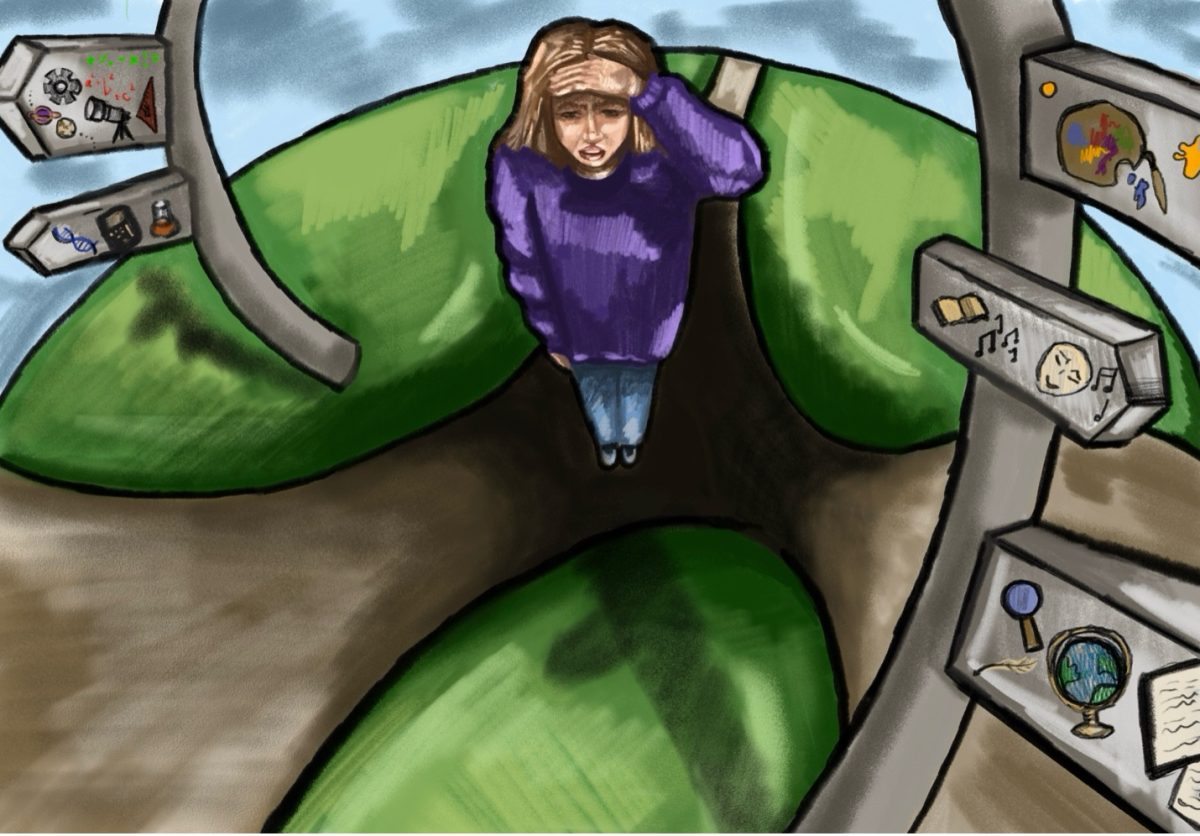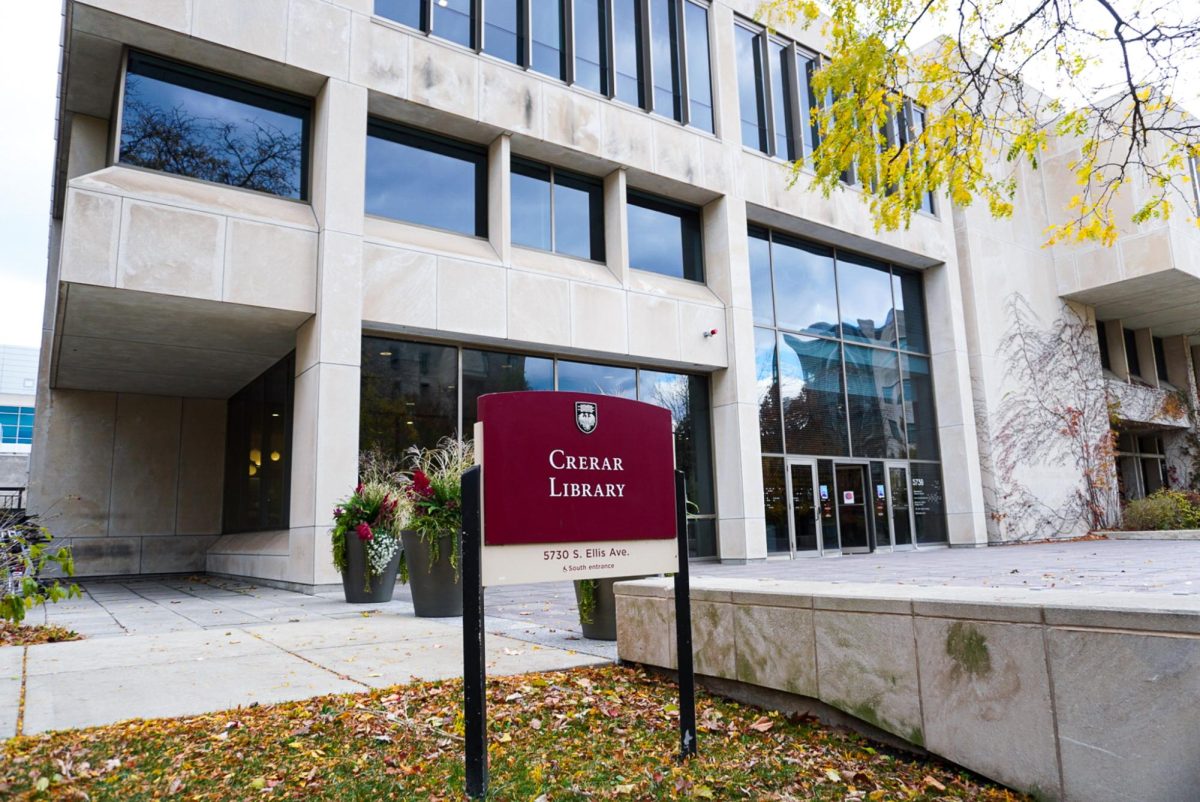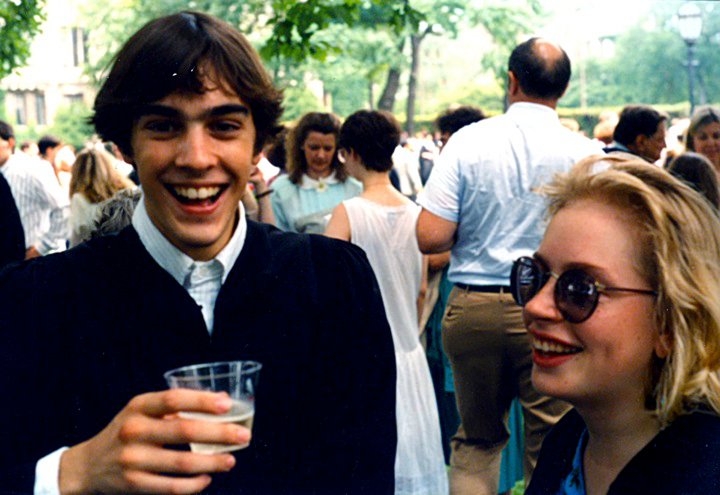When the college application process started, two distinct doors shot up in front of me. They loomed in every corner of life, immense and splintered and, above all, unbearably different from one another, trapping me in an academic crossroads: to the right, the hinges gave way to equations and rulers and technical gadgets. To the left, it was novels and archives and paint-crusted palettes. Standing at the navel of the STEM-humanities Y junction, I dug my heels into the ground, too frightened to move.
For as long as I can remember, I have been equally invested in both the sciences and the arts, left- and right-brain endeavors, numbers and letters, or however you choose to characterize this customary fissure. Naturally, I strove to maintain high levels of scholarly achievement across the board and reveled in any shape or form of academic esteem; but I genuinely enjoyed every single subject and did not feel a certain sway toward one “side,” unlike the majority of my peers. Even as I moved schools and cities and spaces, traversing oceans time and time again as I moved of a conservative British school, a congested California public school, and an arts-oriented, laissez-faire high school in Brooklyn, my pursuits remained ramified, and the thought of sacrificing one subject for another was unappealing and unnecessary. More importantly, it was never asked of me.
It was only when I clicked “create” on my College Board account that the whole world transfigured into one big, fat pointer finger beckoning me to pick. The two doors taunted me. Aware of my anxieties, my friends, family, and school counselors were eager to remind me of the considerable time I had to actually declare a major, of the interdisciplinary approach to studies so many institutions championed, of the ultimate lack of direct correlation between one’s undergraduate diploma and career path (“I majored in Spanish and now I work in tech!”). But, scrolling through countless universities’ major offerings, I saw myself from above, looming over a list of ice cream flavors with last-meal conviction . When I filled in my “intended major” on applications, I went to sleep with crawling skin, unnerved by the sinking sensation that I’d soon have to make the irrevocable choice between doing physics and writing essays for the first time in my life.
The question of double majoring, naturally, was appealing from the get-go; it was the only thing that placated me. In my college search, I honed in on UChicago immediately: the Core, the quarter system, the pledge to unrestrained intellectual and multidisciplinary curiosity. It evidently was the most promising place on the double majoring front. My intended programs of study were astrophysics and English language and literature, the former a bulky course with rigid requirements, the latter an elective-driven exploration. When I received my UChicago acceptance letter, I envisioned (after much disbelief and much crying) a thrilling, secret double life. I’d be a “Hannah Montana” of UChicago, only with reading glasses instead of a blonde wig—cosmologist by day, writer by night.
But I still mulled over the choice of study—or, in truth, of the distinct path that would lead to a career.
To be candid, I did hope that taking Core classes would tip the balance. I thought that maybe bad grades and harsh professors would leave a sour taste in my mouth, and then I’d be forced to opt out of astrophysics or English entirely. And, in hindsight, many first-year “weed out” classes almost did the trick. Electricity and Magnetism made me nauseous, and my midterm grade begged me to run in the other direction. But, even in the face of all these woes, the idea of shutting down that chunk of my life felt to me as drastic as slicing off a limb.
That’s the snag: there was nothing motivating my decision to double major beyond the fact that it embodied my entire being. Contrary to many of my UChicago classmates who double majored in STEM or economics as well as the arts or humanities, I did not pick one program for fun and one for financial security. I did not intend to utilize English as a low-stakes fallback or filler, nor did I want it to be a siren song for recruiters desperate for eloquent engineers. And, on the contrary, I did not plan for astrophysics to be an employable crutch. In fact, in light of my first-year physics strife, it was more professionally precarious than its humanities counterpart. Both majors were pure fun, ultimately, and both were mine.
The question of financial security can’t be ignored, sure, but it seems no path is really financially secure anymore. Sellout culture, careerism, anti-intellectualism—these trends, in light of attacks on higher education and, even closer to home, efforts to shrink area studies, are atrophying our University’s “learning for learning’s sake,” “life of the mind” pedagogical approach, snapping its ideals like tendons in the name of fiscal damage control and the boring excuse that changing times bring such transformation in their wake. The University’s Division of the Arts & Humanities has taken a fly swatter to several Ph.D. and Master’s programs. Biomedical and physical sciences are at risk across the nation. My near-and-dear fields of astrophysics and aerospace engineering in particular face significant blows as NASA faces drastic budget cuts. All the while, the prospect of an AI-driven future throws more confusion into the fire as even the most bulletproof jobs are vulnerable.
The academic maelstrom seems to have “checkmate!” written all over it. How are we to engage in unbridled intellectual inquiry if several areas of inquiry are being bridled? How are we to choose a program of study in the face of such imminent threats—threats that appear to be thrown, at this point, indiscriminately at all facets and fields of higher education?
I see no point in picking a door anymore; I’m likely to brawl with a troll under the bridge on either trajectory. And frankly, though the hapless circumstances yield a whole different breed of worries, I am overcome by a peculiar sense of relief. My majors have become essentially indistinguishable in value, having suffered a reduction to the fundamentals of what a major actually should be—a special set of courses, pursued out of pure interest, without the promise of a job at the end of either road. No more “for fun” or “for financial security” labels; the latter is too finicky, too precarious a judgment to make. So, for the first time, I feel free to pursue both of my majors for fun. Liberated from making the daunting either-or verdict, I can see clearly that there are two wonderful opportunities in front of me, and two is greater than one.
From a professional standpoint, double majoring also seems like the smartest move here. Not solely because you may earn more than a single major graduate, or because both STEM and the arts and humanities equip you with myriad skills that are transferable across industries, but because simple statistics are in your favor; with double the degrees, you have double the job opportunities. In a time where endless research opportunities, grants, and jobs are at risk, a STEM-humanities double major feels like a cheat code, like a trick up one’s sleeve. And I know that this sentiment is rife with pessimism, but the Office of Career Advancement will never cease to clutter our inboxes, so we may as well stack the deck.
I’d then be contradicting myself if I claimed that double majoring transcends careerism and anti-intellectualism entirely, but I do believe that equal dedication to and respect for all academic fields one loves make for the most personal, interdisciplinary, and inquisitive experience we as college students can get our hands on at this moment in time.
It’s been proclaimed time and time again, but STEM and humanities do not exist as separate, antithetical entities. They consistently work in tandem as meticulous correspondents , informing how this scientific notion may inform that cultural phenomenon. In high school, I quoted historical readings in last-period physics, utilized geometric rules in advanced painting, and incessantly (perhaps often insufferably, too) sought to discover new cross-disciplinary analogies and links, without which I believe I would have been left to create and submit one boring thing after another. This alliance between the sciences and the arts, for which I am a confident torchbearer , is a fundamental pillar of the innovative intellectual sphere our institution defends. As I enter my third year at UChicago, I fondly look forward to hearing my classmates mention their biological studies in a literature discussion section, furrowing my eyebrows momentarily, and then finally oohing and aahing at the unforeseen connection.
Going into the process of writing this column, I knew I did not want to offer a viewpoint strictly on the credentials and logistics of being a STEM-humanities double major; there already exist columns on the more quantitative benefits of pursuing such a course of study. I also do not intend to adopt a pitiful tone. I do not want to promise history majors that they can become teachers, or publishers, or that they may even go to law school under particularly fruitless circumstances. I do not want to fearmonger to computer science majors about intelligent robots or tell them to pick up a book.
All I aim to convey is this: I fear so many current or prospective STEM-humanities double majors will falter under the maddening prospect of choice, thinking that a concession will ultimately save them time and hassle and deliberation, and get them that golden job. They can’t ignore the two doors, immense and splintered—but look; they aren’t so different. The doubts are one and the same.
I contemplate what lies further down the Y junction. But I pick up my heels and traverse a wonky trail, heading somewhere, keeping my eyes peeled on both paths. My schedule will teeter with classes, and my career advisor will watch me bewildered, and my head will hurt from knowledge, but in a wonderful way. I promise it’s a good kind of pain that penetrates both sides of the brain instead of just one.
Sofia Cavallone is a third-year in the College.
















